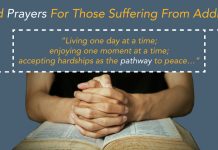Thursday, September 01, 2005 How to pray before reading the Bible
Last night, John Piper gave these simple suggestions on how to pray before reading your Bible in the morning. He prays this for himself and for those he loves almost every day:
- Incline my heart to your testimonies (Psalm 119:36)
- Open my eyes that I may see wonderful things out of your law (Psalm 119:18)
- Unite my heart to fear your name (Psalm 86:11)
- Satisfy me in the morning with your steadfast love (Psalm 90:14)
This is how we should pray even when we don’t have the joy in God that we should!
0 Comments:
dwight-wagner.blogspot.ru
The next time you sit down to read your Bible, take a moment to reflect on the prayer of a pastor who, in March of 2010, held the New Testament, in his own language, for the very first time (Prayer is at minute 1:45 of the video, but watch the whole thing).
O God, O God. The plan which you had from the beginning, regarding your Kimyals which already existed in your Spirit. The month that you had set, the day that you had set, has come to pass today. Oh my Father, my Father. The promise that you gave Simeon that he would see Jesus Christ and hold his arms before he died. I also have been waiting under the same promise, O God. I have also been waiting under that same promise, O God. You looked at all the different languages and chose which ones will be put into Your Word. You thought that we should see Your Word in our own language. Today, the day you had chosen for this to be fulfilled, has come to pass. O God, Today, you have placed Your Word into my hands, just like you promised. You have placed it here in our land. And for all this, O God, I give You praise.
ryanburns.me
I rounded the corner and saw her. She stood frozen, open-mouthed in front of the rows of Bibles in the religion section at Barnes and Noble. She wanted to read the Bible; she hadn’t known there would be so many options.
Her facial expression said it all: I have no idea where to start.
Scores of people feel overwhelmed when it comes to reading the Bible. Maybe, even now, you’re shaking your head in agreement, thinking, Yes. That’s me.
My new friend looked visibly relieved when I asked if she’d like help choosing a Bible. She looked even more relieved when I showed her where and how to start reading.
May I reach across the computer screen and help you, too?
SEE ALSO: 5 Ways Daily Bible Reading Impacts Your Life
These are my top suggestions for beginners to the Bible:
Table of contents
- 1 1. Choose a Bible version that’s understandable and easy to read.
- 2 2. You don’t have to start at the beginning.
- 3 3. Pick a book of the Bible and work your way through it.
- 4 4. Read a little every day.
- 5 5. Pray before you begin.
- 6 6. Write it down.
- 7 1. Choose a Bible version that’s understandable and easy to read.
- 8 2. You don’t have to start at the beginning.
- 9 3. Pick a book of the Bible and work your way through it.
- 10 4. Read a little every day.
- 11 5. Pray before you begin.
- 12 6. Write it down.
1. Choose a Bible version that’s understandable and easy to read.
Here’s the flat out truth: If we don’t understand it, we won’t read it.
The Bible was originally written in Hebrew and Greek. One of the earliest translations to English was the King James Version (KJV) of the Bible, but today we have a variety of versions to choose from. Some translations focus on being more precise and are best for Bible study, while others focus on readability and are great for devotions.
If you’re a beginner, I recommend the New Living Translation (NLT), or a study Bible in the English Standard Version (ESV) or New International Version (NIV). The NLT version of the Bible is most readable while still being literal in its translation; the Study Bibles contain footnotes that explain difficult to understand passages of Scripture.
SEE ALSO: How to Read the Bible Every Day
You can also download a Bible app or read the Bible at biblestudytools.com. These are great tools for beginners and veterans alike.
2. You don’t have to start at the beginning.
The Bible contains 66 separate books compiled into one book. The 39 books of the Old Testament are the story of God and his people before the coming of the Messiah—Jesus. The 27 books of the New Testament pick up the story beginning with the birth of Jesus.
If you’re new to the Bible, the best place to start is the Gospel of John. This book (the fourth book in the New Testament) is John’s eyewitness account of the life of Jesus. As one of Jesus’ closest disciples, John’s account is both riveting and informative.
John’s purpose in writing is to help us believe, making it the ideal place to start. “These things were written to help you believe that Jesus is the Messiah, the Son of God, and that by believing you may have life in his name” (John 20:31).
SEE ALSO: Top 5 Places to Start Reading the Bible
3. Pick a book of the Bible and work your way through it.
If you’re anything like me, you need a Bible reading plan or you’ll waste precious minutes thumbing through the Bible, never quite landing. So pick one book of the Bible and read a little each day, one chapter, perhaps.
If you read one chapter of John a day, (which will take no more than 5-10 minutes) you’ll read John in it’s entirety in 21 days.
After reading John, move on to the other gospels – Matthew, Mark or Luke. Next read Philippians, Ephesians and Colossians, which provide practical encouragement and instruction for living the Christian life. Romans is jam-packed with essential doctrine. Genesis explains how everything began. Psalms is filled with heartfelt prayers that offer encouragement for every season of life.
Work your way through one book at a time, and you’ll never find yourself fumbling for where to read again.
4. Read a little every day.
Getting God’s Word into your life doesn’t have to take long. Start small—five or 10 minutes is better than none. Sometimes less is more, especially when reading less means you’ll actually remember more.
Chose a time and place that’s convenient for you. Many people read their Bible first thing in the morning, choosing to spend time with God before daily distractions get in the way. But if mornings aren’t your thing, don’t sweat it. That you read God’s Word is more important than when you read God’s Word. Personally, I love to read my Bible at a local coffee shop, but I once read through the entire Bible while waiting in carpool lines.
5. Pray before you begin.
Pause before you open your Bible and ask God to speak to you. Remember, the Bible is God’s Word; it is God’s love letter written to His people, which includes you.
Ask God to help you understand His Word. Ask God use His Word to teach you, to direct you and even to re-direct you, when necessary. Ask Him to use His Word to help you know Him and love Him.
Jeremiah 29:13 says, “You will seek me and find Me, if you seek Me with all your heart.” God loves to reveal himself to those who seek Him.
6. Write it down.
As you read the Bible ask two questions:
- What does this teach me about God?
- What does this teach me about how I should live?
No doubt, as you read you’ll find one or two verses that seem to leap off the page. Maybe they speak to an issue you’ve been grappling with; maybe they answer a long held question; maybe they give you comfort or encouragement; maybe they provide an example to follow or avoid.
When a verse resonates with you, stop and write it down, word for word. Pause to let the message sink in because these words are God’s words to you.
This practice has cemented God’s Word into my thoughts in countless ways. Sometimes I keep the verse with me throughout the day. Sometimes I ask God to help me remember it when I need it. Sometimes I memorize it. Be intentional about getting God’s Word into your thoughts and you’ll soon see your relationship with God thrive and your life change.
The Bible was never meant to merely inform us; the Bible was meant to transform us.
It’s been years since I encountered the gal at Barnes and Noble but when I think of her, I smile. Her story is our story. We all begin somewhere in our relationship with God.
And we all need someone to show us how.
Donna Jones is a national speaker who travels from coast to coast helping women find and follow God in real, everyday life. She’s the author of Seek: A Woman’s Guide to Meeting God, Taming Your Family Zoo and Raising Kids with Good Manners. She resides in southern California with her pastor hubby and their three kids. She loves a good cup of coffee, great conversation and laughing until her sides hurt. For more on her books, ministry or free resources, visit Donna at www.donnajones.org.
Photo courtesy: Thinkstockphotos.com
Publication date: January 19, 2017
www.crosswalk.com
I rounded the corner and saw her. She stood frozen, open-mouthed in front of the rows of Bibles in the religion section at Barnes and Noble. She wanted to read the Bible; she hadn’t known there would be so many options.
Her facial expression said it all: I have no idea where to start.
Scores of people feel overwhelmed when it comes to reading the Bible. Maybe, even now, you’re shaking your head in agreement, thinking, Yes. That’s me.
My new friend looked visibly relieved when I asked if she’d like help choosing a Bible. She looked even more relieved when I showed her where and how to start reading.
May I reach across the computer screen and help you, too?
SEE ALSO: 5 Ways Daily Bible Reading Impacts Your Life
These are my top suggestions for beginners to the Bible:
1. Choose a Bible version that’s understandable and easy to read.
Here’s the flat out truth: If we don’t understand it, we won’t read it.
The Bible was originally written in Hebrew and Greek. One of the earliest translations to English was the King James Version (KJV) of the Bible, but today we have a variety of versions to choose from. Some translations focus on being more precise and are best for Bible study, while others focus on readability and are great for devotions.
If you’re a beginner, I recommend the New Living Translation (NLT), or a study Bible in the English Standard Version (ESV) or New International Version (NIV). The NLT version of the Bible is most readable while still being literal in its translation; the Study Bibles contain footnotes that explain difficult to understand passages of Scripture.
SEE ALSO: How to Read the Bible Every Day
You can also download a Bible app or read the Bible at biblestudytools.com. These are great tools for beginners and veterans alike.
2. You don’t have to start at the beginning.
The Bible contains 66 separate books compiled into one book. The 39 books of the Old Testament are the story of God and his people before the coming of the Messiah—Jesus. The 27 books of the New Testament pick up the story beginning with the birth of Jesus.
If you’re new to the Bible, the best place to start is the Gospel of John. This book (the fourth book in the New Testament) is John’s eyewitness account of the life of Jesus. As one of Jesus’ closest disciples, John’s account is both riveting and informative.
John’s purpose in writing is to help us believe, making it the ideal place to start. “These things were written to help you believe that Jesus is the Messiah, the Son of God, and that by believing you may have life in his name” (John 20:31).
SEE ALSO: Top 5 Places to Start Reading the Bible
3. Pick a book of the Bible and work your way through it.
If you’re anything like me, you need a Bible reading plan or you’ll waste precious minutes thumbing through the Bible, never quite landing. So pick one book of the Bible and read a little each day, one chapter, perhaps.
If you read one chapter of John a day, (which will take no more than 5-10 minutes) you’ll read John in it’s entirety in 21 days.
After reading John, move on to the other gospels – Matthew, Mark or Luke. Next read Philippians, Ephesians and Colossians, which provide practical encouragement and instruction for living the Christian life. Romans is jam-packed with essential doctrine. Genesis explains how everything began. Psalms is filled with heartfelt prayers that offer encouragement for every season of life.
Work your way through one book at a time, and you’ll never find yourself fumbling for where to read again.
4. Read a little every day.
Getting God’s Word into your life doesn’t have to take long. Start small—five or 10 minutes is better than none. Sometimes less is more, especially when reading less means you’ll actually remember more.
Chose a time and place that’s convenient for you. Many people read their Bible first thing in the morning, choosing to spend time with God before daily distractions get in the way. But if mornings aren’t your thing, don’t sweat it. That you read God’s Word is more important than when you read God’s Word. Personally, I love to read my Bible at a local coffee shop, but I once read through the entire Bible while waiting in carpool lines.
5. Pray before you begin.
Pause before you open your Bible and ask God to speak to you. Remember, the Bible is God’s Word; it is God’s love letter written to His people, which includes you.
Ask God to help you understand His Word. Ask God use His Word to teach you, to direct you and even to re-direct you, when necessary. Ask Him to use His Word to help you know Him and love Him.
Jeremiah 29:13 says, “You will seek me and find Me, if you seek Me with all your heart.” God loves to reveal himself to those who seek Him.
6. Write it down.
As you read the Bible ask two questions:
- What does this teach me about God?
- What does this teach me about how I should live?
No doubt, as you read you’ll find one or two verses that seem to leap off the page. Maybe they speak to an issue you’ve been grappling with; maybe they answer a long held question; maybe they give you comfort or encouragement; maybe they provide an example to follow or avoid.
When a verse resonates with you, stop and write it down, word for word. Pause to let the message sink in because these words are God’s words to you.
This practice has cemented God’s Word into my thoughts in countless ways. Sometimes I keep the verse with me throughout the day. Sometimes I ask God to help me remember it when I need it. Sometimes I memorize it. Be intentional about getting God’s Word into your thoughts and you’ll soon see your relationship with God thrive and your life change.
The Bible was never meant to merely inform us; the Bible was meant to transform us.
It’s been years since I encountered the gal at Barnes and Noble but when I think of her, I smile. Her story is our story. We all begin somewhere in our relationship with God.
And we all need someone to show us how.
Donna Jones is a national speaker who travels from coast to coast helping women find and follow God in real, everyday life. She’s the author of Seek: A Woman’s Guide to Meeting God, Taming Your Family Zoo and Raising Kids with Good Manners. She resides in southern California with her pastor hubby and their three kids. She loves a good cup of coffee, great conversation and laughing until her sides hurt. For more on her books, ministry or free resources, visit Donna at www.donnajones.org.
Photo courtesy: Thinkstockphotos.com
Publication date: January 19, 2017
www.crosswalk.com










